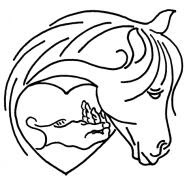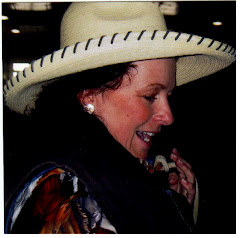In the July newsletter we talked about "Revealing the Truth Within". I suggested how to tap into the potential of both the horse and rider in order to release their "imprisoned splendor". I believe that in order to "Reveal the Truth Within" we must first crack through any "defensive behaviors", open the mind to new information, listen to different points of view, and be willing to look for and try new ways of doing things.
Then in last months newsletter I identified "Defensive Behaviors" in the human that may hinder us from "Revealing the Truth Within". I suggested fear as one of the main causes of "defensive behaviors". Then I concluded that by recognizing our "defensive behaviors" and replacing them with positive progressive knowledge and self-control the relationship with our horses can develop into a partnership where dreams will be realized.
I then promised to continue the discussion this month by discussing "Defensive Behaviors of the Horse".
When a horse is providing us with some less than positive feedback it becomes very easy to stick a label on the horse. I believe horse's do have individual personalities, and we have to learn to work with their inborn characteristics. But more often than not what people label as a negative personality trait is really just the horse finding a way to escape the situation that is uncomfortable at best and intolerable at worst.
Some examples of "Defensive Behaviors" displayed by horses are:
Defensive Behaviors: Disrespectful, Pushy, Dominant, Mouthy
This is one of the most common labels given to horses. A horse will lack respect for the human who is not a good leader. A disrespectful horse is testing the mental fitness of the rider as a leader. Once a horse has granted enough trust to accept the human as a herd member the one big question every horse has is, "where does this human fit in the pecking order?" If we are not more emotionally, mentally and physically fit and balanced than our horse we will rank lower.
Remedy: Understanding the horse's nature and needs, Protect Your Space
The common remedy of making the horse submit with force, fear, intimidation and pain is seldom the answer. You may gain his attention but not his true respect. Only fair and just leaders gain our true respect. On the other hand we can't love a horse into respect either.
Working with a horse's true nature and meeting his individual needs is the only thing that ultimately earns the horse's vote for your leadership. This means learning to be as soft as possible yet as firm as necessary depending on the situation. Become more interesting to this horse and keep him moving. Don't let him move you around. Every time you move him out of your space you move up in rank.
Defensive Behaviors: Aggressive, Dangerous, Mean, Unpredictable, Explosive,
As prey animals horses are naturally defensive. Their first instinct for self-preservation is flight or escape. However, sometimes when they are pushed hard enough, or if their genetics are right, they decide the best defense is a good offense. Horses that take an offensive position to defend themselves are simply expressing an extroverted behavior of defensiveness rooted in mistrust. This is usually caused by over aggressive handlers who may also be reacting out of ""defensive behavior" rooted in fear.
Remedy:A calm, focused leader who can balance firmness with friendliness
An extroverted, aggressive horse needs clear, firm and absolutely consistent boundaries for acceptable and unacceptable behavior. Again this means learning to read the horse and the circumstance so you know when to be soft and when firmness is required and how much. What firmness means to one horse is not firm to another depending on their inborn nature. Interrupt their habits and patterns by constructively redirecting their energy.
Defensive Behaviors: ADD, No attention span, Naughty, Spooky, Wayward
This horse is trying to use mental distraction to cope with things. By focusing on anything but the rider the horse can avoid interaction. These horses are often tense, unpredictable and have a tendency to "freeze" and then explode. These horses are often misread. Most of the time the purpose of their "defensive behaviors" are to shut us out, much like a teenager who pretends they don't hear what we are saying.
Remedy: Focus, Slow down way down, Time and Repetition
A mentally distracted or disassociated horse needs help learning to focus on simple things. They need all the time and repetition it takes to process and accept new information. Slow down and take the time it takes with them and they will reward your effort. They need their thoughts politely interrupted and redirected as this helps them learn to focus. Sometimes it may feel like you have to do things a million times before they get it, but hang in their they need your strong focus and patience to keep them on track. Sometimes the best thing to do with them is nothing for quite a while until they become confident and curious enough to want to engage with us.
Defensive Behaviors: Lazy, Stupid, Stubborn, Dull, Sully, Unmotivated, Bored
This horse is choosing the route of introversion to escape from the rider. They "go away" mentally and emotionally in order to cope with the situation. They are not afraid of people and can be disobedient when they are left brained and un-confident when right brained. These horses have a tendency to buck because they don't want to go forward. This horse can out last most people. They simply stay non-responsive until you give up.
Remedy:Become more interesting, peek their curiosity, use variety
Introverted horses need to be drawn out into freedom of expression. This may mean you need to allow more mistakes, ask the horse to figure somethings out for itself and allow some time for the horse to move freely and imperfectly without a rider. Don't be fixated on perfecting a maneuver, this makes them act up because they are confident fast learners when using the left side of their brain. Whatever you do don't drill this horse use some creativity with obstacles and playful things to do.
Defensive Behaviors: Fearful, Frantic, Panicky, Crazy, Hypersensitive, Ballistic, Nervous, Hot, Over-reactive,
These horses are considered dangerous because they don't have self-control and have a lot of trouble learning. They have difficulty with anything new. They do not deal well with change. These horses are just trying to cope by utilizing the flight mechanism nature has provided, and they lack trust for the rider. Hot blooded horses are often left in a state of perpetual fear because people think they don't have the ability to work in a calm, focused manner.
Remedy:Simplicity, Consistency, Safety, Comfort, Relaxation, Trust
An extroverted, fearful horse needs simplicity and consistency to the
point of boredom until it finally feels safe enough to relax. These horses need lots of approach and retreat. More retreat than approach. Don't push them past thresholds you will blow their confidence in you, themselves and the situation. Repetition will be your friend with this horse because change scares them, so go slow and help them feel safe and comfortable. Once you get them to relax and trust you there isn't anything they won't do for you.
Recognizing negative behavior as a defense mechanism in the horse allows us to offer a better way to interact with our horses. A way that the horse can learn to enjoy the interaction as much as we do.
If we take a perspective towards balance we begin to recognize what the horse needs in order to drop the defensive behaviors and start to want to work with us. The imbalance may be emotional, mental or physical and it is up to us to discover the heart of the problem. Balancing a horse's behaviors has many facets and by using the remedy ideas listed above we can begin to break through the various defense mechanisms of the horse.
Happy Trails,
Sherry Sherry
Wednesday, August 27, 2008
Subscribe to:
Post Comments (Atom)













No comments:
Post a Comment